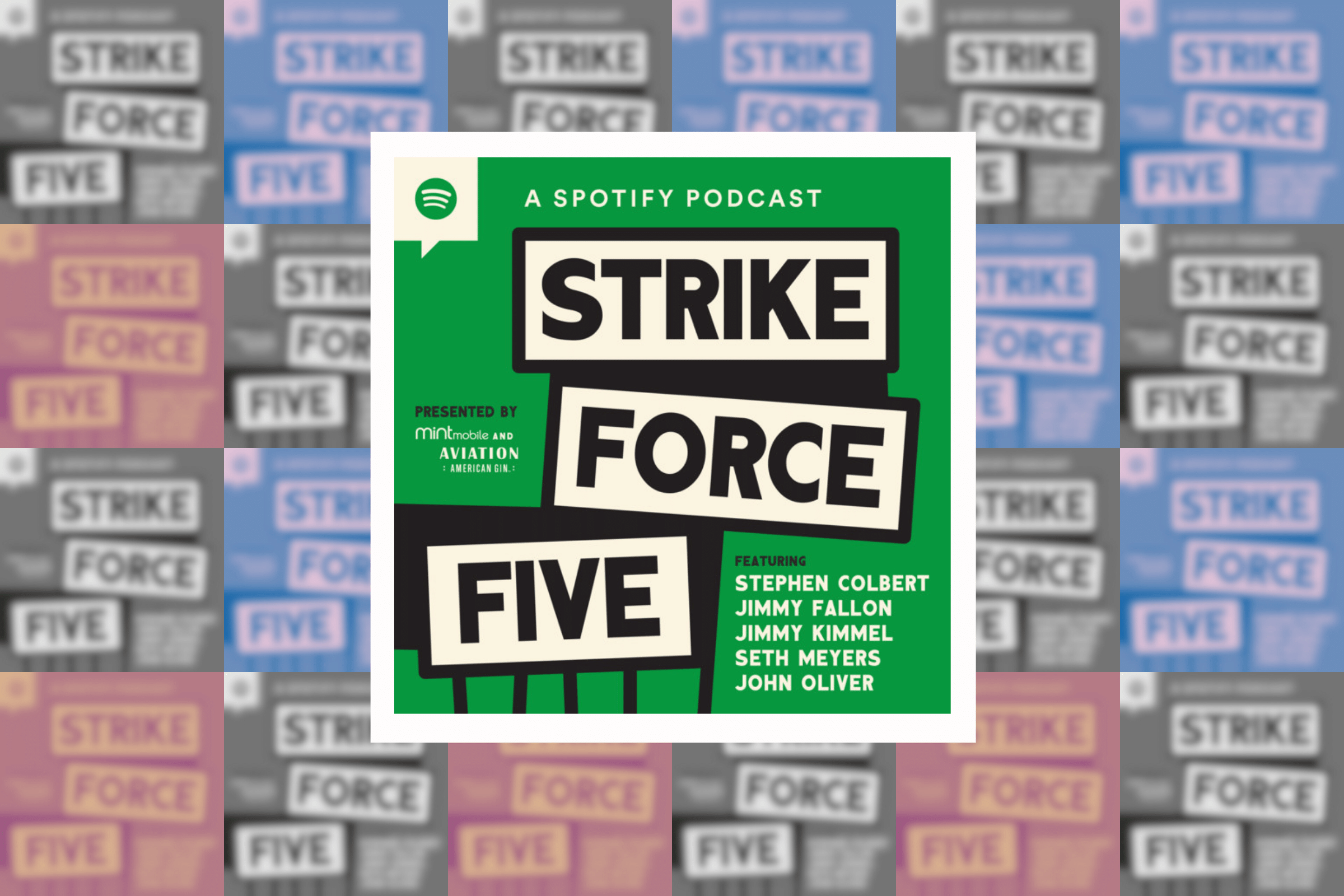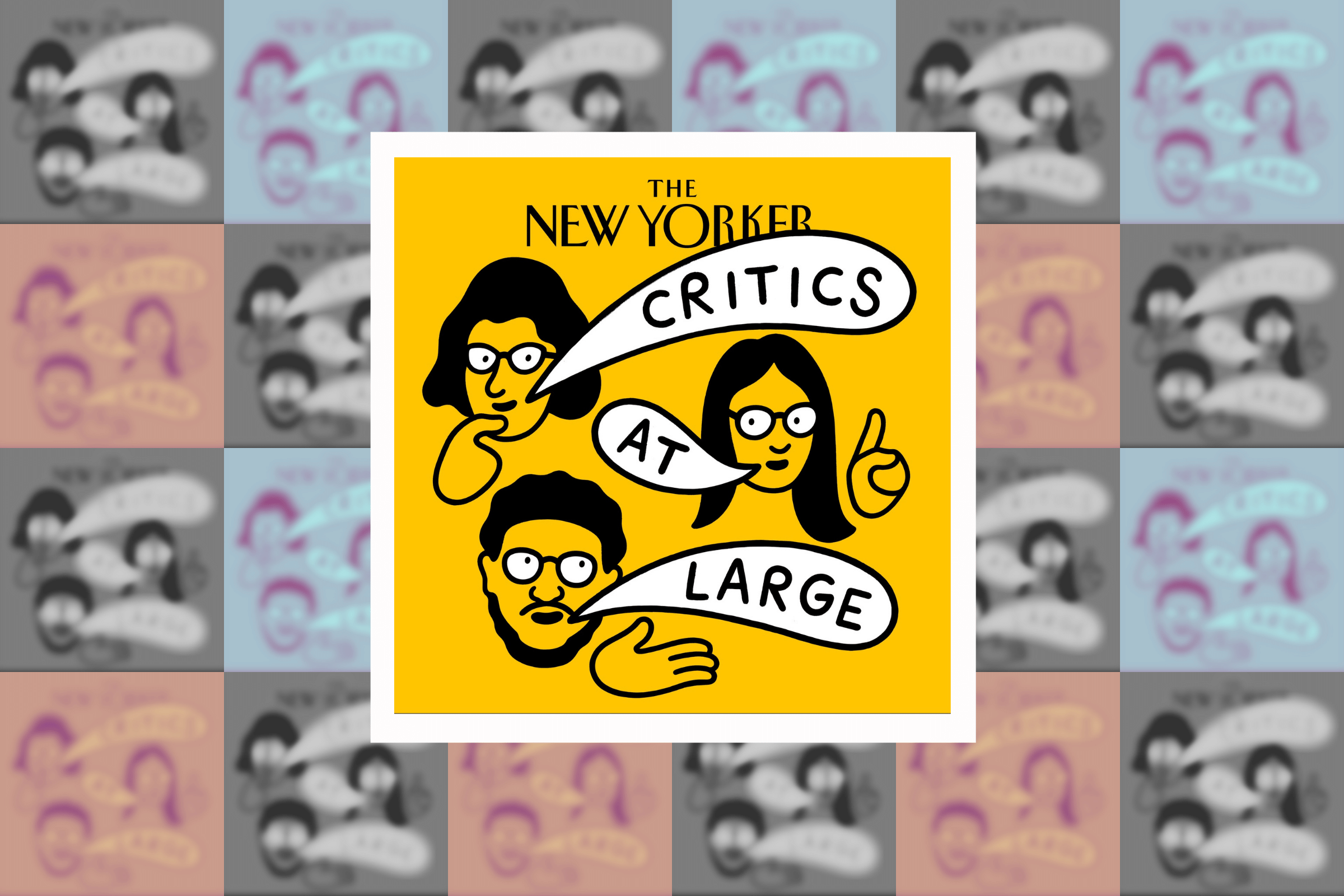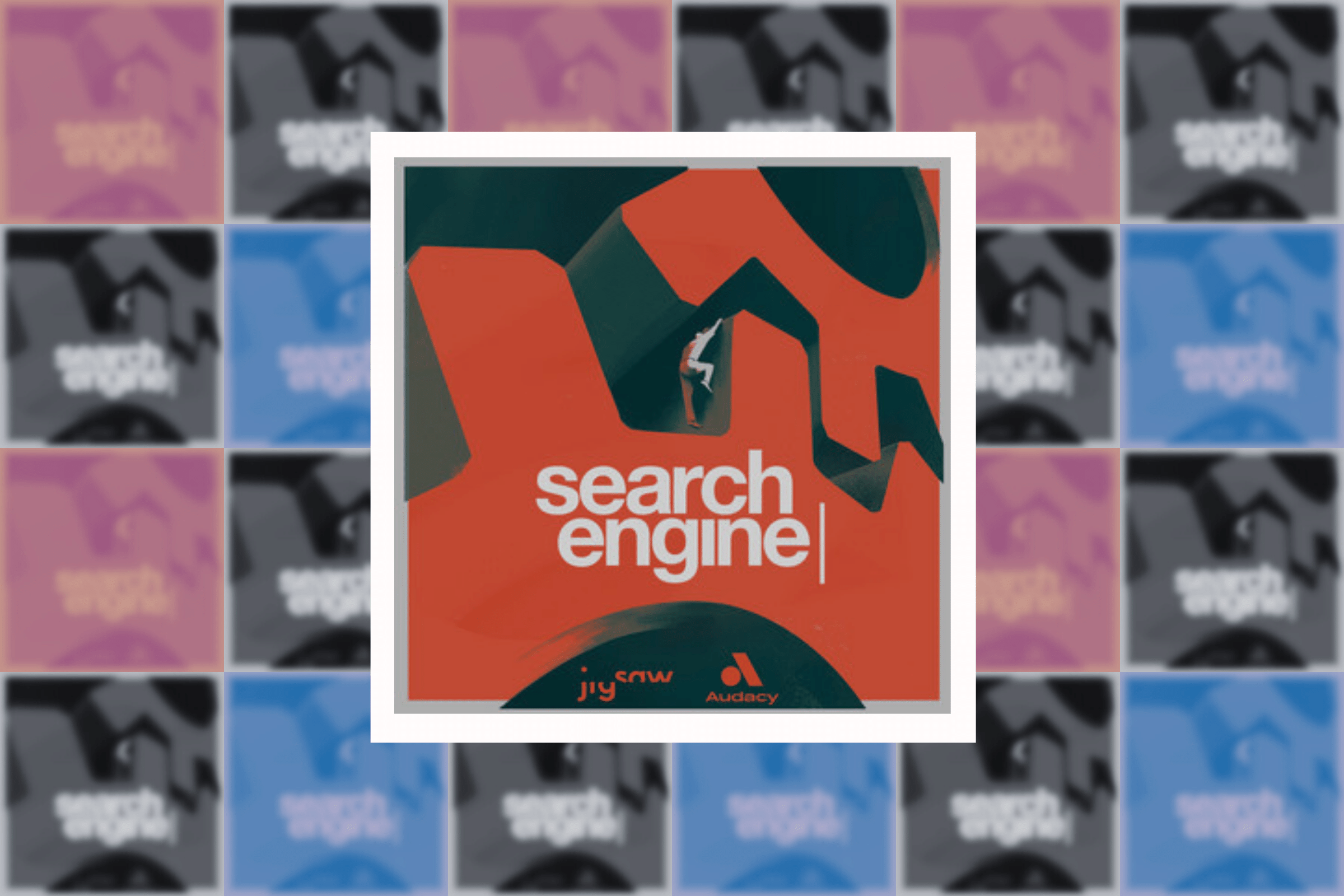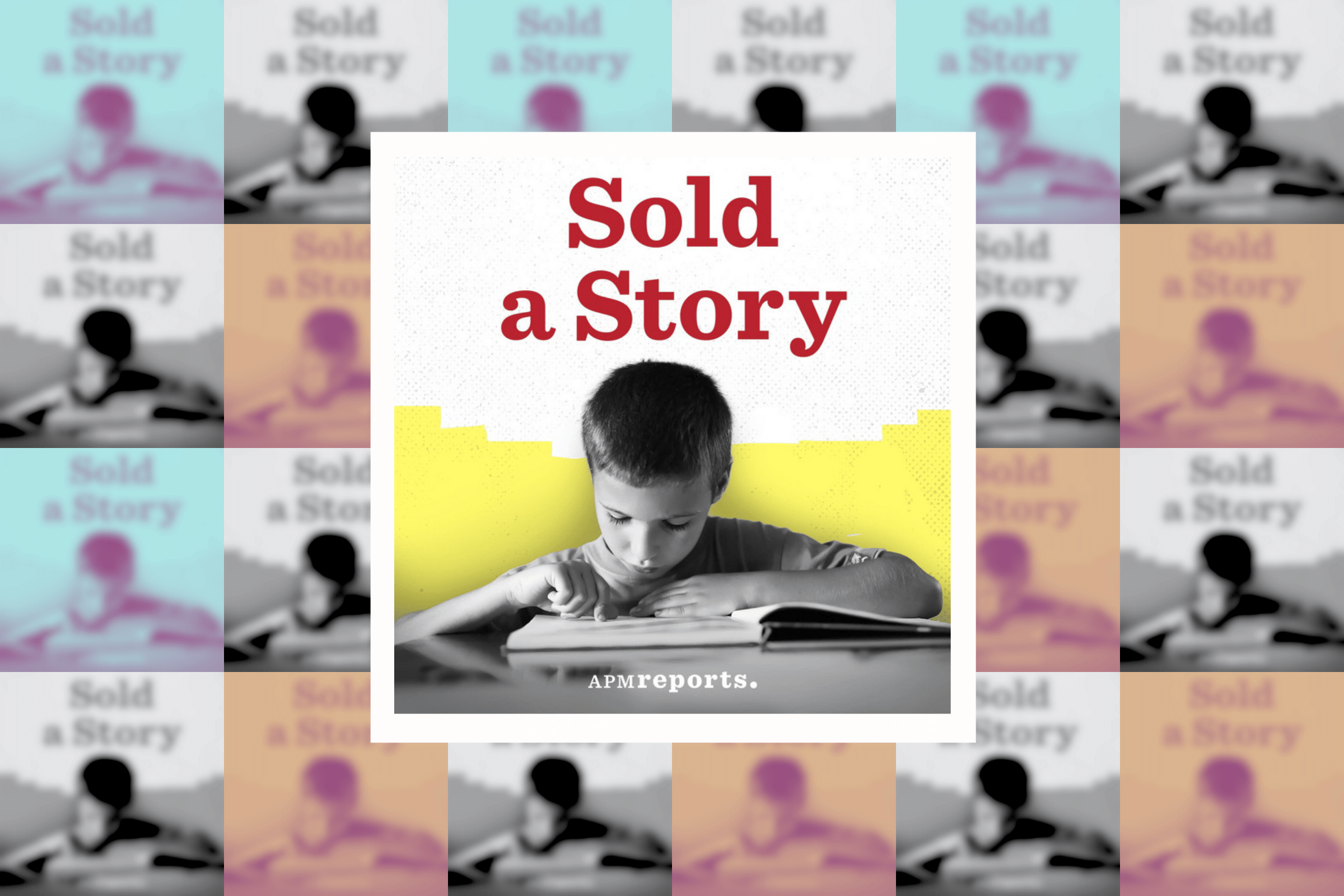
The podcast bubble is bursting: This year has been filled with a slew of cutbacks and cancellations as major players like Spotify discover that hiring a former royal is no guarantee of retaining an audience. But perhaps podcast producers will return to their roots, turning away from half-baked celebrity series and back to chatty shows where critics talk about culture, to shows with well-researched investigative journalism and explorations of hefty topics like class—ideally with a charming host who knows how to keep even heavy subjects light.
Those kinds of podcasts make up most of my feed, though admittedly I did get lured by some big names this year, specifically Paul McCartney and the various late-night hosts, who eschewed self-congratulation and found ways to offer new insights and laughs to their listeners. Without further ado, here are the best podcasts of 2023.
10. Strike Force Five

Toward the end of the Hollywood writers' strike, all five late-night hosts—Stephen Colbert, Jimmy Kimmel, John Oliver, Jimmy Fallon, and Seth Meyers—teamed up for a single podcast, the proceeds of which went entirely to their striking staffs. The hosts took some time to figure out the comedic rhythm of the show, proof of the value of their writers. But these funny men found their groove in their attempts to one-up one another with anecdotes about interviewing manic celebs and tease each other about their respective comedic styles. Celebrity podcasts can be self-aggrandizing and irksome, but this particular group charms with their willingness to humiliate themselves. In one of the funniest episodes, Fallon tries to host a version of the Newlywed Game for the other hosts and their wives but fails spectacularly and earns laughs from his peers in the process. Certain anecdotes, like Kimmel's attempt to get a vasectomy during the writers' strike, and recurring bits, like one about Fallon's failed attempt to read Moby Dick, will have you laughing out loud.
Start With: "Stories We Missed, Vasectomies, and Moby Dick" on Apple and Spotify
9. ParentData With Emily Oster

The popular economist-turned-parenting guru Emily Oster relaunched her podcast this fall. In her hit books Expecting Better, Cribsheet, and The Family Firm (with another pregnancy book due next April), Oster has taken a data-driven approach to parenting through different stages of a child's life, focusing on facts over anecdotes and distinguishing causality from correlation. The books have spawned a newsletter, weekly Q&As on social media, and now a series of interviews. In the new version of the podcast, she speaks to some of the experts—researchers, doctors, and academics—conducting studies and offering advice on issues like when to introduce kids to common allergens, whether puberty is starting earlier, and how to talk to children about grief. It's an indispensable tool for parents who want to keep up with the latest research and guidance.
Start With: "Introducing Allergens: What We've Been Getting Precisely Wrong" on Apple and Spotify
8. McCartney: A Life in Lyrics

Irish poet Paul Muldoon spent hours interviewing Paul McCartney for The Lyrics: 1956 to the Present, a tome co-written by Muldoon and McCarthy on the songs conceived by the legendary Beatle. But for those who don't own the doorstopper of a book—or want to dive even deeper into McCartney's brain—the podcast offers bite-sized episodes, each dedicated to a different song. Muldoon and McCartney chat in a casual and candid manner about the inspiration behind some of his most influential lines and riffs. He even reveals new tidbits about life as a Beatle. Some of the insights are profound: McCartney may have unconsciously plucked the phrase "Let it be" from Hamlet's death scene. Some are simply fascinating: Apparently, McCartney is a dog person, and John Lennon was a cat person—decide for yourself how that may have contributed to their incredibly productive partnership and the group's eventual dissolution.
Start With: "Eleanor Rigby" on iHeartRadio, Apple, Spotify, Pushkin, and YouTube
7. Critics at Large

Your podcast feed may well be filled with chatty shows about new movies, books, and television series, but this new entry in the genre merits a listen. New Yorker writers Naomi Fry, Vinson Cunningham, and Alexandra Schwartz convene each week to talk about cultural phenomena, from Martin Scorsese's oeuvre to Taylor Swift's cultural dominance, and they've already found a pleasant rhythm. Unlike other podcasts that focus solely on a particular piece of art each episode, these critics begin with a deep read of a new release—say, the new Elon Musk biography or Britney Spears' memoir—but then broaden the conversation to larger issues like the mythos of the tech genius or the evolution of the celebrity memoir. Fry, Cunningham, and Schwartz happen to be three of the smartest cultural critics working today and setting them free to talk about the larger implications of any one piece of culture plays to their strengths as thinkers and conversationalists.
Start With: "The Myth-Making of Elon Musk" on Apple or Spotify
6. You Didn't See Nothin

To call You Didn't See Nothin a true crime show would be a disservice to this tale that's more of a memoir. The show follows host Yohance Lacour as he revisits a 1997 hate crime on the South Side of Chicago that led him to the world of investigative journalism. As the media transformed the story about a well-connected white kid in Chicago leading a beating of a Black boy into an idealized story of racial reconciliation, Lacour conducted his own reporting on the incident. He examines how those events impacted the trajectory of his own life. He's as much a part of the story as the crime itself, and his reflections and connection to the community he's investigating elevate the material beyond the typical podcast of the genre.
Start With: "1 - Young Black Male" on Apple and Spotify
5. Search Engine

After the uber-popular podcast Reply All imploded, co-host PJ Vogt set out on his own. After a bout of soul searching and a brief diversion into investigating crypto, he has now settled on a podcast concept that could, in theory, sustain him for years. Each week, he tries to answer questions that range from silly to serious: "Why can't we just turn the empty offices into apartments?" "How do I find new music now that I'm old and irrelevant?" "Why are drug dealers putting fentanyl in everything?" Vogt finds the relevant writers and experts to investigate these mysteries. Questions beget more questions, and the best episodes eventually evolve into engaging conversations with smart people: I recommend his talk with New York Times columnist and Vox co-founder Ezra Klein about whether there is a "sane way to use the Internet." Search Engine is more than just a spiritual successor to Reply All: One can imagine a world in which Reply All would have eventually evolved into Search Engine as "the Internet"—the purview of Reply All—became an ever-more-dominant element of our daily lives even as the hosts strived to spend more time offline. Reply All was fun because it always offered listeners a sense of mystery and discovery. Search Engine carries on that tradition.
Start With: "Is There A Sane Way to Use the Internet?" on Apple, Spotify, and YouTube
4. Hard Fork

The New York Times' relatively new technology podcast has become an instant must-listen for anyone interested in how A.I. is changing the ways students study (and cheat), whether a city filled with driverless cars is actually viable, and what it means for the rest of us that tech billionaires are challenging one another to cage matches. On the funny and informative show, journalists Kevin Roose and Casey Newton tackle the weekly tech news with a light touch, often debating the absurdities of a society in which, increasingly, everyone is constantly staring at their phones. They manage to find the ideal balance between news and commentary.
3. Sold a Story

We have been teaching kids the incorrect way to read for decades. Outlets, including this one, have reported on how the decision at schools across the country to abandon research-backed methods—namely the "Science of Reading" or phonics—in favor of "decoding" words based on clues like pictures has taken a major toll on kids' literacy: One in three American fourth graders reads below a basic level. Journalist Emily Hanford, who has been raising the alarm about this problem for years, lays out how America got here in a show that plays like she's unwinding a mystery. Through interviews with teachers, parents, and advocates, she delves into how one education guru managed to convince so many teachers that children decoding text based on pictures was superior to learning to connect letters and sounds—a position she's since doubled back on—how politics played a major role in the education shift, and how we can right the ship. This series was published in 2022, but the host published bonus episodes in 2023, which allows me to extol the virtues of this investigative podcast, if only a little late.
Start With: "The Problem" on Apple and Spotify
Read More: Inside the Massive Effort to Change the Way Kids Are Taught to Read
2. Classy With Jonathan Menjivar

Jonathan Menjivar straddles two worlds. He considers himself part of the media elite: He lives on the East Coast, admits to owning cashmere socks, and has worked for some of the most influential people in journalism. But he grew up in a working-class Latino family and has become hyper-conscious of how money and social perceptions touch every part of society, from fashion to military recruitment. In a series of enthralling interviews, Menjivar explores all the specific and not-always-expected ways moving up and down the social ladder has affected people's lives. In an episode featuring Wyatt Cenac, the comedian talks about making it big and wondering if he's a "classhole" before losing it all and going deeply into debt. An episode with musician Jarvis Cocker explores how destabilizing it can be when music about growing up blue collar suddenly makes you rich. Menjivar weaves in his own experiences with class discomfort and talks with his old boss, Fresh Air host Terry Gross, about how even cultural references made on her show can create points of class tension.
Start With: "Are Rich People Bad?" on Apple and Spotify
1. The Retrievals

Sometimes a podcast grabs you by the lapels and demands your attention. The Retrievals is a masterwork in investigative reporting from Serial and the New York Times into a Yale University Medical Center nurse who siphoned off fentanyl from patients undergoing egg-retrieval surgery, leaving them in unspeakable pain. When the women complained, they were dismissed by the doctors and, later, the university. Host Susan Burton follows the extraordinary tale, told largely from the perspective of these women desperate to conceive a child, through the nurse's criminal case. It's a horror story about the ways our health system fails women. But what most stands out are the accounts from the victims, some of whom actually empathize with the nurse who was hooked on painkillers—at least to a point. Many of the women are professors or researchers at the university and view their situation through the prism of their own work on addiction or medicine. Many of the women rationalize their misery, either speculating they "deserve" to experience pain because their bodies are failing them when it comes to reproduction or that they're willing to put up with the agony because they already associate motherhood with hardship. It's a disturbing commentary on how we as a society perceive the quest for pregnancy and motherhood.
Start With: "Episode 1: The Patients" on Apple, Spotify, and YouTube
Read More: Why There's So Much Pregnancy Trauma on TV and Podcasts Right Now
More Must-Reads From TIME
- The 100 Most Influential People of 2024
- Coco Gauff Is Playing for Herself Now
- Scenes From Pro-Palestinian Encampments Across U.S. Universities
- 6 Compliments That Land Every Time
- If You're Dating Right Now , You're Brave: Column
- The AI That Could Heal a Divided Internet
- Fallout Is a Brilliant Model for the Future of Video Game Adaptations
- Want Weekly Recs on What to Watch, Read, and More? Sign Up for Worth Your Time
Write to Eliana Dockterman at eliana.dockterman@time.com